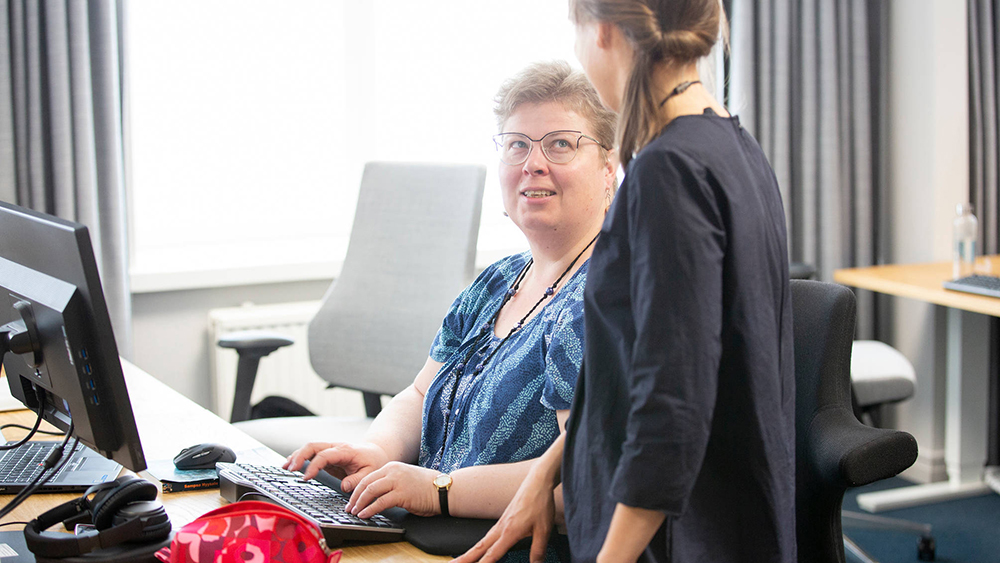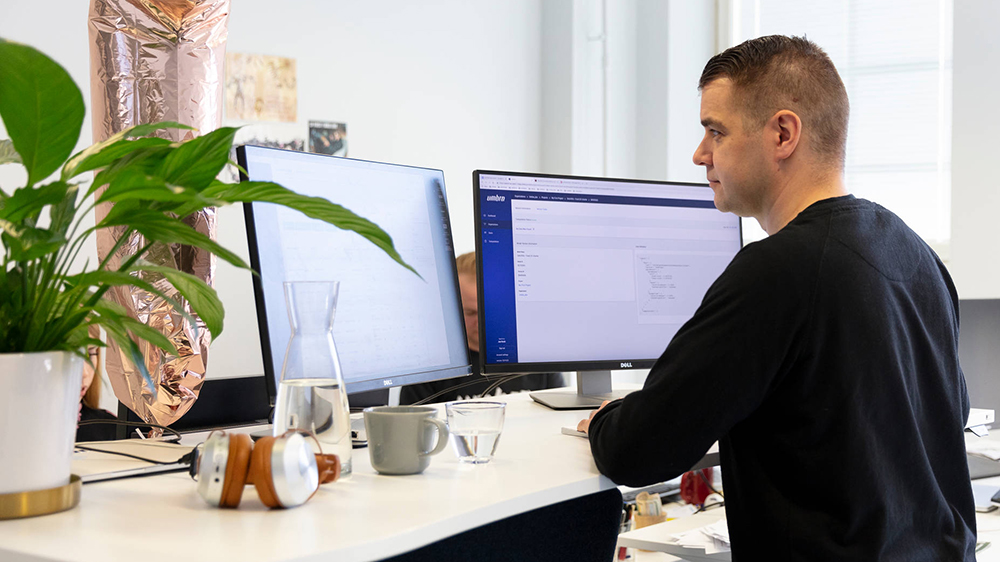Other funding targets under the Sustainable Growth Programme in the Ministry of Economic Affairs and Employment and government agencies under its purview

Reforms and investments will strengthen the long-term growth potential and resilience through investments in RDI, green transition and competence in line with the recommendations of the European Semester for economic policy coordination. The employment rate will be raised quicker and public employment services will be reformed. The reforms and investments will mitigate the effects of the coronavirus pandemic on identified target groups. The digital service system and structures will be improved. More support will be available for raising the level of competence and education, and existing competencies will be converted to meet the needs of working life.
Other funding targets
Digitalisation and data economy
The Real Time Economy project
- Contents: The Real Time Economy project will create the conditions for companies to move to real-time economy. Business information is transferred automatically between different systems, and invoices and receipts are electronic. Up-to-date information and its automated processing will increase productivity both in companies and public administration.
- Schedule: On 15 June 2021, the Ministry of Economic Affairs and Employment set up the Real Time Economy project for 2021–2024.
- Total funding: EUR 14 million.
- Responsible party: The Finnish Patent and Registration Office coordinates the project.
- Results: The Real Time Economy (RTE) project created the conditions and structures for more extensive implementation of the real-time economy. The foundation of an ecosystem for the RTE is built on business transaction documentation (e-invoices, procurement messages and e-receipts). In 2022, the RTE project described a minimum viable ecosystem, based on the effectiveness of the e-invoicing system and the e-invoice ecosystem built around it. This in turn has served as the basis for a wider RTE ecosystem. In 2024, the project described the functioning of procurement messages and e-receipts in the national operating environment, along with the solutions and rules enabling data exchange. The project developed solutions enabling the exchange of business transaction documents in a structured and machine-readable format and increasing the automation of business processes. To promote the deployment of electronic documents for business transactions, the project published guidelines, provided training and carried out marketing and communication campaigns aimed at businesses. The project achieved its targets for increasing the volume of e-invoice and e-receipt exchange between organisations. E-invoices now account for about 93 per cent and e-invoices for about 20 per cent of the total volumes.
The RTE project promoted the digitalisation of financial administration and procurement by helping to introduce structured Peppol-based documents and messages. The Peppol (the Pan-European Public Procurement Online) Network provides specifications for technical infrastructure and standardised messaging, and agreements and rules for cross-border electronic procurement.
The RTE project designed solutions that are compatible with international and EU standards, promoting companies' international competitiveness. In accordance with the European Interoperability Framework (EIF), set up by the European Commission, the project measures took into account different levels of interoperability. The project also implemented the objectives of the Nordic Smart Government and Business programme in Finland.
The project created a joint management model and tools for companies' RTE ecosystem, ensuring that the private and public sectors can engage in continuous RTE development together. The project carried out several cost-benefit analyses, dozens of pilots and customer needs analyses, preliminary studies related to legislation, and information security and data protection studies. The project enabled the sharing and automation of financial data and the implementation of companies' digital wallet transactions. A roadmap for 2025–2030 presents the next steps to expand the RTE.
Press release, 15 June 2021: New project to help companies digitalise their financial administration
Inquiries:
Project Director Minna Rintala (Finnish Patent and Registration Office - PRH) firstname.lastname(a)prh.fi
Fight against money laundering
- Contents: The reform will improve the authorities’ access to information and the automated collection of information in order to prevent money laundering. In addition, the aim is to increase cooperation between the authorities and develop preventative measures. The reform involves legislative amendments with regard to the implementation of several investments. Based on an intermediate target, the projects within the programme will be planned and piloted by 2023. Digital tools will be in use by 2026.
- Schedule: 2021–2026
- Total funding: EUR 10 million.
- Responsible parties: Ministry of Economic Affairs and Employment and Ministry of Finance
Project to ensure effective supervision and enforcement of the prevention of money laundering (in Finnish)
Employment and labour market
Nordic labour market service model
- Contents: A key premise of the Nordic labour market service model is a comprehensive reform of the jobseeker service process towards a more individualised approach. The aim is to provide strong support at different stages of job search. The reform process requires both legislative amendments and changes to information systems.
- Schedule: The appropriations of TE Offices will be increased by EUR 70 million from 2022 (funding for 2022 will come from the RRF). In addition, the RRF will fund the implementation of key information system changes required by the model by EUR 20 million (EUR 13 million in 2022).
- Total funding: EUR 90 million.
- Responsible party: The reform proposal was prepared in cooperation with stakeholders, with responsibility from the Ministry of Economic Affairs and Employment.
- Results: The Nordic labour market service model was introduced on 2 May 2022. Human resources at TE Offices have been boosted by nearly 1,200 experts since 2022. The impact of the service model on employment is expected to be fully achieved from the beginning of 2025. The information system specifications and modifications necessitated by the Nordic labour market service model have been made. The new booking and videoconferencing system has been taken into productive use. Before it is phased in, the customer information system to be introduced in 2023 will also be modified to conform with the requirements of the Nordic labour market service model.
Streamlining the work and education-based immigration process – OLEDIGI-project
- Contents: The objective of the project is to create a fast track for the residence permit applications of highly skilled individuals and growth entrepreneurs as well as their family members to pledge processing within 14 days for applications that meet the criteria, and to shorten the processing times of other work-based and education-based residence permit applications to an average of 30 days.
- Schedule: 2021–2024
- Total funding: EUR 20 million
- Responsible parties: The cross-administrative project is steered and coordinated by the Ministry of Economic Affairs and Employment. The main responsibility for implementing the project rests with the Finnish Immigration Service, which is the owner of the key information system UMA. Other parties also responsible for implementation of the project are Business Finland, the Ministry of Education and Culture, the Finnish National Agency for Education and the Ministry for Foreign Affairs.
- Results: The fast track for highly skilled individuals and high-growth startup entrepreneurs as well as their family members has been fully in place since December 2022. Monitoring has shown that the average processing time of fast-track applications has been well within the service promise. The project drafted amendments to the Act on the Conditions of Entry and Residence of Third-Country Nationals on the Basis of Research, Study, Internship and Volunteering (719/2018), which entered into force on 15 April 2022. The amendments to the sections on work and self-employment in the Aliens Act (301/2004) entered into force on 23 February 2023. The legislative amendments enabled matters such as granting residence permits for students for the duration of studies and the employer certification procedure. The project implemented the technical changes required by the legislative amendments, and a significant number of other changes advancing the digital transformation. Technical measures implemented with the Recovery and Resilience Facility (RRF) funding, such as data exchange interfaces, automation, and other steps at the initial stage, and the development to enable the continuity of the system's life cycle, all contributed to the achievement of the project's main objective of 30 days' processing time of work-based and education-based residence permits in 2024. The RRF funding was also allocated to assisting and advising clients and to improving the capabilities for knowledge-based management.
Promotion of migration of talents
Talent Boost programme
Inquiries:
Senior Specialist Essi Lojander (Ministry of Economic Affairs and Employment)
Strengthening the Ohjaamo services for young people through incentives to municipalities
- Contents: An incentive model intended for municipalities, joint municipal authorities and wellbeing services counties that strengthens the multidisciplinary nature of the low-threshold Ohjaamo service points for young people. The grant can be applied for the remuneration of experts in healthcare, social welfare and education services operating in the one-Stop Guidance Centre. Municipalities, joint municipal authorities or wellbeing services counties in whose area a youth service point Ohjaamo is located can apply for the grant.
- Schedule: The calls for funding is open on 1.10.2023–31.10.2025. Funding under the project is available until 31 December 2026.
- Total funding: EUR 6.5 million
- Responsible party: Ministry of Economic Affairs and Employment
- Results: 115 government grant decisions (up to January 2026)
Press release, 29 September 2023: Ohjaamoiden kannustinmalli saa jatkoa (in Finnish)
Inquiries:
Chief Specialist Janne Savolainen (Ministry of Economic Affairs and Employment)
Raising the level of skills and continuous learning
Reform of continuous learning
- Contents: The reform of continuous learning will improve the availability and effectiveness of foresight data and create targeted study offerings that are based on the foresight data and relevant to working life. The reform will also increase outreach activities, support measures and provision of low-threshold educational opportunities for groups that are under-represented in education. The Ministry of Economic Affairs and Employment is responsible for enhancing foresight on short-term labour and competence needs, strengthening lifelong guidance, and developing practices for competence recognition in respect of people of working age. The project involves updating the Occupational Barometer, enhancing quality, coordination and knowledge-based management in lifelong guidance, and developing practices and tools for demonstrating the competences of people of working age. The aim of the measures is to stem the flow of people into unemployment and inactivity and to improve employment and the availability of competent workers. The reform of continuous learning will support the growth potential and renewal of working life, companies and society as well as the vitality of regions. The bodies taking part in the implementation of the measures are the Ministry of Economic Affairs and Employment, the Development and Administrative Centre for the ELY Centres and TE Offices (KEHA Centre), the Service Centre for Continuous Learning and Employment and the Finnish National Agency for Education.
- Schedule: Reform of continuous learning will be implemented in 2021–2024
- Total funding: EUR 44 million (of which a funding share of EUR 7.65 million under the Ministry of Economic Affairs and Employment)
- Responsible parties: The reform will be implemented in cooperation by the Ministry of Economic Affairs and Employment and the Ministry of Education and Culture.
- Results: The updating of the Occupational Barometer was launched in the project on foresight on short-term labour and competence needs. The barometer name was changed to Labour Force Barometer. The updating project aimed to produce more extensive and high-quality information on the current state and prospects of the labour market. The Labour Force Barometer will focus on the key outlook and labour needs of regions and sectors.
As part of the package of strengthening lifelong guidance, the Development and Administration Centre for the Centres for Economic Development, Transport and the Environment and the Employment and Development Offices created a framework for career planning skills, related support materials for guidance professionals, and a self-assessment tool for career planning skills. As part of the guidance competence package, continuing professional education was provided for guidance sector professionals and online training was created for the eOppiva platform. Around 300 guidance professionals participated in the continuing education. Studies were carried out to draw up the competence descriptions of guidance professionals and to describe the overall structure of training provided for guidance professionals. As part of the coordination package of the Ministry of Economic Affairs and Employment, an evaluation study on the state of guidance and a monitoring framework were completed in October 2024. Finally, the project published a Handbook on Lifelong Guidance, which brings together information from the projects, and helped to develop the sections for guidance professionals in the Osaamispolku (Competence Path) service.The working group on the identification of prior learning completed its work and published its final report at the end of 2024. The working group published an interim report in December 2022 and, in line with the report proposals, launched three studies, seven pilots and the implementation of the Osaaminen näkyväksi ohjauksella (Making competence visible through guidance) online training in eOppiva. Finally, the project contributed to developing a competence mapping tool for the Osaamispolku service. The projects were implemented using public procurement during in 2023 and 2024.
Inquiries:
Senior Adviser Teija Felt (Ministry of Economic Affairs and Employment)
Project component ‘Digital services package for continuous learning’ under the continuous learning digitalisation programme
- Contents: The digitalisation programme for continuous learning consists of two mutually supportive projects: a digital service package for continuous learning that covers the entire education system and crosses administrative boundaries as well as a package of digitalisation and flexible learning in higher education. The aim of the project component of digital services for continuous learning is to build services to support educational and career choices as well as the maintenance and enhancement of skills throughout working careers and lives, and to promote matches between the supply and demand of employment and education. The services now being built will also support the work of providers of guidance services in seeking education and in job-seeking by means including expansion of the knowledge base available to counsellors and the provision of new, smart services as well as making high-quality guidance tools easier to find. In addition, the information services provided will support strategic planning on the part of the various actors (including ones in education and in working life). The continuous learning digital services package is rooted in a new kind of intersectoral culture that enables better and more efficient services/service paths.
- Schedule: The digitalisation programme will be built in stages during 2021–2025.
- Total funding: Continuous learning digital services package EUR 22 million (Digitalisation programme for continuous learning EUR 32 million).
- Responsible parties: The continuous learning digital services package will be implemented jointly by the Ministry of Economic Affairs and Employment and the Ministry of Education and Culture.
- Results: Target architecture report and target group-specific service concepts prepared. Expansion of educational offering service started (completed in December 2023). Analysis pilots relating to employment and education opportunities launched. Competition impact assessment prepared on market-driven educational offering.
Inquiries:
Chief Specialist Tiina Salminen (Ministry of Economic Affairs and Employment)
Sectors affected by the COVID crisis
Sustainable growth and digitalisation in the tourism sector
- Contents: The investment aims to develop tourism companies and regions in Finland by promoting the sustainability of activities and the monitoring and assessment of tourism development as well as the sales of tourism services, particularly in the digital operating environment. The investment will create concrete tools for calculating the carbon footprint of tourism services and for knowledge-based management in tourism companies and regions. In addition, coaching programmes will be created to support the renewal and growth of the sector.
- Schedule: 2021–2024
- Total funding: EUR 10.75 million
- Responsible party: The Visit Finland unit of Business Finland
- Results: A The national indicator system for sustainable tourism was introduced in 2022, and the tool is under continuous development. The first annual sustainable tourism status report based on the indicator data was published in 2023 and the second in 2024. In 2023, 322 companies and 19 destinations participated in the collection of indicator data. Seven new coaching modules were added to Visit Finland Academy’s offering of sustainable tourism programmes and the content of four coaching modules were updated. The Sustainable Tourism Guide has been thoroughly updated and incorporated into the STF Hub. Visit Finland’s first climate action plan for the entire tourism industry was published in 2023, and the biodiversity package for tourism will be published towards the end of 2024.
The carbon footprint calculator for the tourism sector, Hiilikuri, has been completely updated and integrated into the digital service developed for the STF programme, STF Hub, during 2024. In early autumn 2024, the digital database on tourism products and services launched by Visit Finland in 2021 contained more than 9,000 products and more than 15 channels published information through the interface. The programme to boost tourism through digital channels in 2023–2024 supports regional tourism organisations, destinations and companies in international growth, teaching them to utilise various digital sales and distribution channels.
The Matkailijamittari monthly statistics on spending and travel behaviour of foreign tourists, which has been developed jointly by Visit Finland and Statistics Finland, has been published since June 2023. A segmentation survey on foreign tourists was carried out in 2023, the results and tools of which are utilised by tourism areas, companies and Visit Finland Academy coaches. The national knowledge-based management model for tourism was prepared together with the tourism industry in 2021. The model will be updated at the end of 2024. Visit Finland has also produced several dynamic reports to support tourism areas and companies in the introduction of new data sources. These include sustainable tourism indicators, content of the DataHub database, Matkailijamittari, statistics on short-term rental accommodation, and a comparison of tourism trends in the Nordic countries.
National sustainable travel indicators (in Finnish)
Visit Finland Data Hub
2023–2024 programme for using digital channels to boost tourism (in Finnish)
Matkailijamittari (in Finnish)
Segmentation survey (in Finnish)
Inquiries:
Chief Specialist Sanna Kyyrä (Ministry of Economic Affairs and Employment)
Senior Director Kristiina Hietasaari (Visit Finland) firstname.lastname(a)businessfinland.fi
REPowerEU
Permits related to the green transition
Theme: The aim of the reform is to shorten the processing times of environmental permit procedures for renewable energy investments in Finland. The reform requires legislative changes, more simple procedures and the development and implementation of digital processes, for which REPowerEU aid is allocated.
Timetable: The reform related to the permit procedure is carried out in 2023–2026.
Total funding: EUR 32 million
Responsible parties: The reform is implemented in cooperation with the Ministry of Finance, Ministry of the Environment, Ministry of Economic Affairs and Employment, Energy Authority and Centres for Economic Development, Transport and the Environment.
Inquiries:
Senior Specialist Benita Troberg (Ministry of Economic Affairs and Employment)
Senior Specialist Kimmo Kuusela (Ministry of Economic Affairs and Employment)
Green transition research and development
Theme: The investment supports research and development activities that focus on promoting renewable energy solutions in Finland. The investment consists of three strategic research and development projects. As part of the projects, researchers’ competence in areas such as solutions for clean energy and storage of electricity, energy efficiency in industry, decarbonisation and the renewable hydrogen economy will be supported. In addition, a roadmap for the development of a clean energy system towards 2035 will be drawn up, together with recommendations for measures on developing renewable energy systems.
Timetable: The projects will continue until June 2026.
Total funding: EUR 40 million
Responsible parties: VTT Technical Research Centre of Finland, Finnish Environment Institute, Geological Survey of Finland, Natural Resources Institute Finland
Inquiries:
Senior Specialist Siina Lepola-Lång (Ministry of Economic Affairs and Employment)






